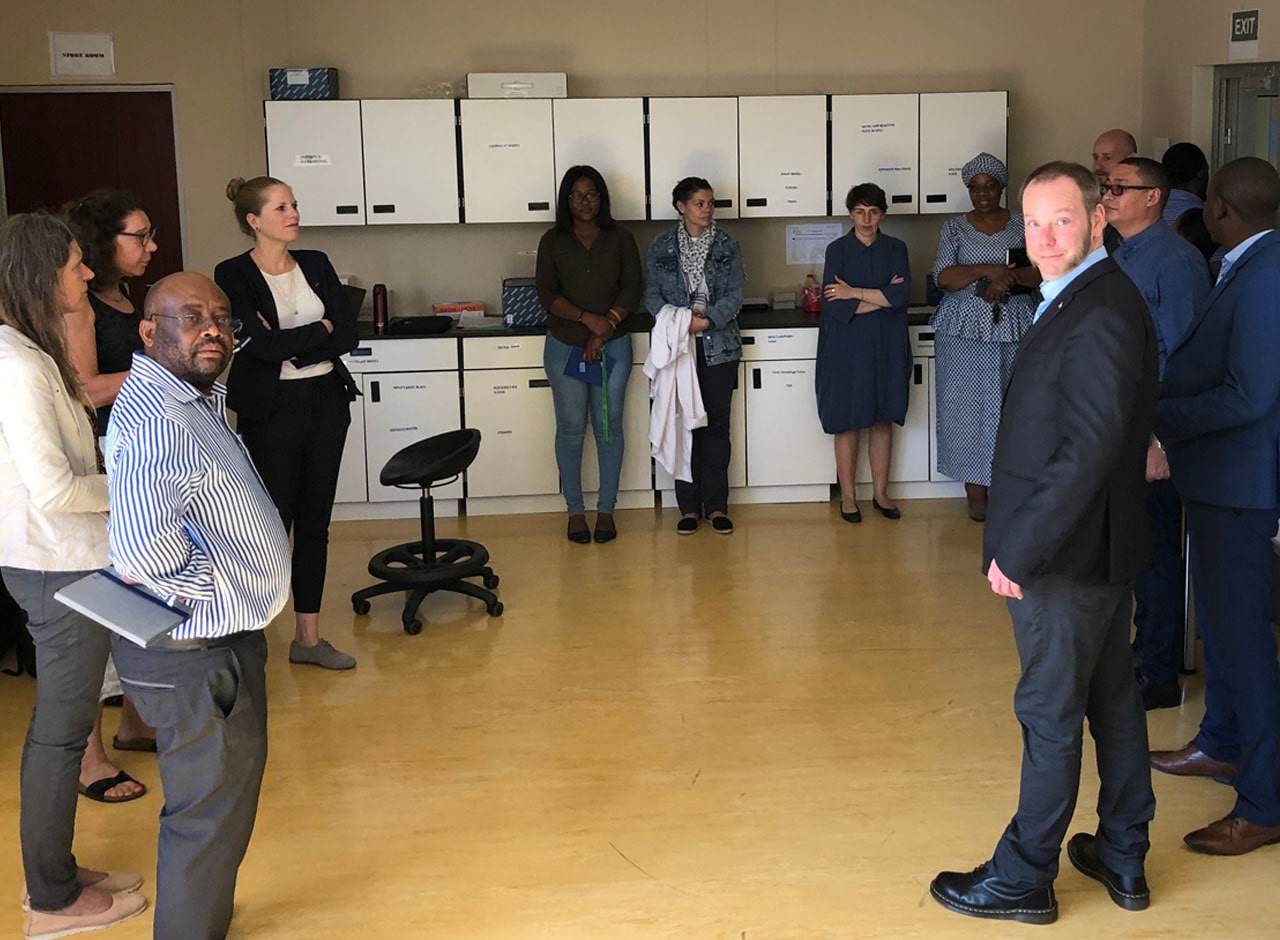Staff Writer
Rapidly identifying infections with the novel corona virus (SARS-CoV-2) is crucial to enable immediate outbreak management and to initiate public health interventions. Germany therefore supports the development of testing capacities for COVID-19 in Namibia. After a first diagnostic laboratory training in Windhoek in the beginning of March the German partners continue to provide critical testing materials like swabs and reagents. This has enabled the Namibia Institute of Pathology (NIP) to conduct more than 2,000 tests in Namibia so far.
This support is based on a recently established working relationship as part of a twinning project between the Robert Koch Institute (RKI) and the Ministry of Health and Social Services (MoHSS) of Namibia. On request of the Government of Namibia RKI assists in the development and implementation of a “Namibia Institute of Public Health” (NIPH), which is funded within the Global Health Protection Programme (GHPP). In the light of the COVID-19 pandemic this collaboration also covers advice on the management of the Emergency Operation Center and procurement of IT equipment for contact tracing.
Just in time support to fight COVID-19
In the light of the COVID-19 pandemic, MoHSS requested in February specific support to build up diagnostic capacities for COVID-19 testing in Namibia. This request would be immediately met by the German Epidemic Preparedness Team (EPT), an initiative launched in 2015 by the Federal Ministry for Economic Cooperation and Development in cooperation with the Federal Ministry of Health during the Ebola epidemic. A team of the EPT consisting of four experts from GIZ, RKI as well as Bernhard Nocht Institute for Tropical Medicine (BNITM) travelled to Namibia in the first week of March 2020 to establish laboratory diagnostics for COVID-19 at the national reference laboratory in Windhoek. The team brought supplies and trained six lab technicians from NIP, the University of Namibia and the Central Veterinary Laboratory. One week after completion of the training, Namibia confirmed its first two COVID-19 cases in the country.
Further and ongoing support is provided by RKI and EPT with several shipments of diagnostic reagents, laboratory consumables and technical equipment to ramp up preparedness of Namibia and meet the rising demand for local testing. On a global level, there is still shortage on reagents for molecular diagnostics and antibody testing for COVID-19 and specific swabs to collect and transport samples. The MoHSS therefore requested further support from the German partners with regard to these critical consumables, which has been delivered with the repatriation flight of Air Namibia on 3 June 2020.
Important pillar of our fight against COVID-19”
“The support of the German Government for COVID-19 diagnostic capacities is an important pillar of our fight against COVID-19”, highlighted Ben Nangombe, Executive Director of MoHSS. Ellen Gölz, Chargée d’Affaires a.i. at the German Embassy Windhoek, said: “We are extremely glad that we were in the position to support Namibia through the EPT and RKI right before the virus reached Namibia. In cooperation with the Namibian Embassy in Berlin we are happy that we can use the recent repatriation flight again for those essential supplies They will enable to conduct during the next month up to 1000 tests in Namibia and also enable the country to initiate a first pilot study on antibodies to SARS-CoV-2 .”
“All over the world, people now realize how important epidemic preparedness, pandemic prevention and the strengthening of health systems are. As devastating as this pandemic is, it presents an opportunity for even closer cooperation in the near and distant future to help countries being better prepared.“ said Dr Michael Nagel (EPT/GIZ). Dr David Uirab, acting CEO of NIP, underlined: “The continuous support provided by Germany enabled us to expand COVID-19 testing in Namibia”. Dr Christian Winter (Twinning Project Coordinator/RKI) emphasised that “the continued support will be expanded to other pathogens and work areas within the Namibia-RKI Twinning Project and will continue to strengthen Public Health in Namibia”.
Robert Koch Institute (RKI)
The RKI is the public health institute in Germany. In the COVID-19 pandemic, the RKI is continuously monitoring the situation, evaluating all available information, estimating the risk for the population in Germany and providing health professionals with recommendations. To detect the SARS-CoV-2 virus, the RKI is using a PCR-protocol, which was developed No. 16/2020 in Germany and which is recommended by the WHO. The RKI is also a global health hub. During the COVID-19 pandemic, it collaborates closely with partner countries and institutions from all over the world in order to investigate pathogens, tackle outbreaks, and to provide reliable diagnostics, train staff and more.
Bernhard Nocht Institute for Tropical Medicine (BNITM)
The BNITM is Germany’s largest institution for research, treatment and training in the field of tropical diseases and new emerging infections. The current scientific focus is on malaria and haemorrhagic fever viruses like Ebola. During the Corona Pandemic the BNITM also coordinates the European Mobile Labs. An approach that has proved to be successfully during outbreaks of other infectious disease, like the Ebola epidemic in West Africa.
Epidemic Preparedness Team (EPT) With the EPT, international development experts from Deutsche Gesellschaft für Internationale Zusammenarbeit (GIZ) together with the international renowned research institutes Bernhard Nocht Institute for Tropical Medicine (BNITM) and the Robert Koch Institute (RKI) support developing countries in preparing for and responding to outbreaks of infectious diseases with epidemic and pandemic potential. During the current COVID-19 pandemic, the EPT is supporting various countries by providing equipment and trainings, e.g. Colombia, Ecuador, Nepal, and Togo.




